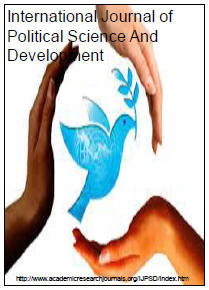| IJPSD |
International
Journal of Political Science and Development |
||||||||||||||||||||||
|
International Journal of Political Science and Development Vol. 3(1), pp. 30–39, January, 2015. DOI: 10.14662/IJPSD2015.001 ISSN: 2360-784X
Research Paper
The Role of ICT for Good Governance and Agricultural Development in Ethiopia: Local Evidence from Southern Ethiopia
Mohammed Yimer
Department of Civic and Ethical Studies, College of Social Sciences and Humanities, Arba Minch University, Ethiopia. Email: muhamed_yimer@yahoo.com
Accepted 14 January 2015
An attempt is made to identify the critical role of Information and
Communications Technology (ICT) for promoting Good Governance and
Agricultural Development in the context of southern Ethiopia. Active
citizen participation, the provision of high-quality service delivery,
influence on government decision-making and execution, the improvement
of government-citizen relationship, and the creation of transparency,
are among the indispensable roles that ICT can play. The overall
implication is the prevalence of rule of law, the ultimate
characteristic of good governance in a country. Such governance
transformations significantly contribute to the promotion of
agricultural development and the consequent long-term transformation of
the economy. ICT can play a crucial role in benefiting resource-strapped
farmers with up-to-date knowledge and information on agricultural
technologies, best practices, markets, price trends, and weather
conditions. The experiences of most countries indicate that rapid
development of ICT, which facilitates the flow of data and information,
has tremendously enhanced knowledge management practice in agriculture.
However, the use of ICT for the accumulation and dissemination of
knowledge and information is still low in Ethiopia, despite progress
made over recent decades. Currently, among various ICT- related
initiatives, radio is widely used to inform users on agricultural
topics, including new and upgraded farming techniques, production
management, and market information. Due to its strategic importance in
reaching the majority of smallholders, attempts are being made to
strengthen the delivery of knowledge and information through radio
programs. Unlike previous trends in using traditional ICT tools (i.e.,
radio and TV), the use of modern ICT (computers, internet, mobile
telephony, etc.) is achieving popular adoption in the small towns of the
country. It is found that low infrastructural development is the main
challenge for ICT in the rural areas of southern Ethiopia. Cite This Article As: Yimer M (2014). The Role of ICT for Good Governance and Agricultural Development in Ethiopia: Local Evidence from Southern Ethiopia. Inter. J. Polit. Sci. Develop. 3(1): 30-39
|
|
|||||||||||||||||||||
